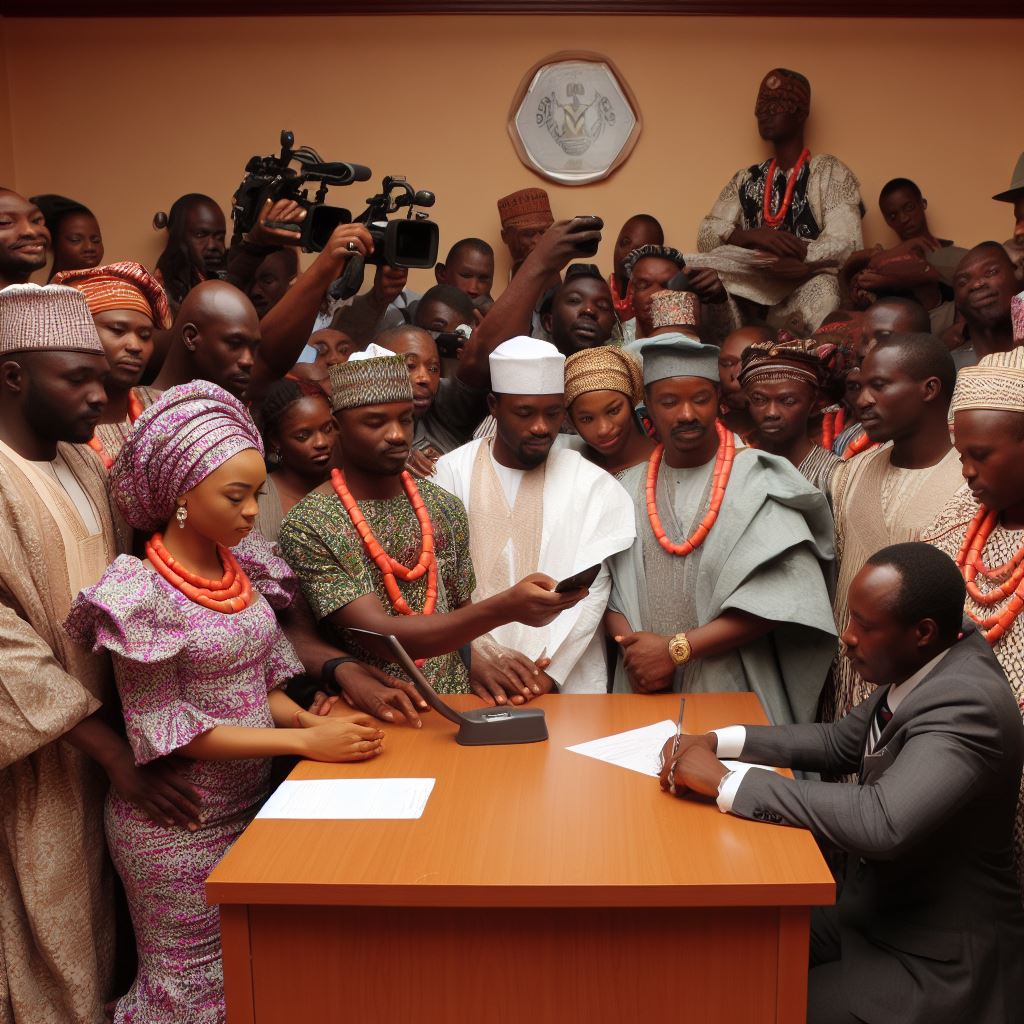Bigamy and the Marriage Act: What Every Nigerian Should Know
Last Updated on January 28, 2024
Introduction
Brief Explanation of Bigamy
Bigamy, the act of marrying multiple partners simultaneously, remains a concern in Nigeria.
It’s a criminal offense under Nigerian law, punishable by imprisonment.
Importance of Understanding the Marriage Act
Understanding the Marriage Act is crucial.
It lays the legal foundation for marital relationships in Nigeria. It specifies the requirements, rights, and obligations of couples.
Purpose of the Blog Post
This blog post aims to shed light on bigamy and the Marriage Act’s role.
By providing clear insights, we empower Nigerians to make informed decisions about marriage and relationships.
It’s our hope that this knowledge will protect the rights and interests of individuals and families, ultimately fostering a society where love and commitment thrive within the bounds of the law.
Definition and Explanation of Bigamy
Bigamy, an act often misunderstood, involves being married to more than one person simultaneously.
This section aims to clarify the definition of bigamy, differentiate it from polygamy, and discuss the legal consequences of participating in such unions.
Definition of Bigamy
Bigamy, in its simplest form, can be defined as the act of entering into a marriage with more than one person at the same time.
Essentially, it involves having multiple spouses concurrently, without the knowledge or consent of the existing partners.
While bigamy is commonly associated with deceit and dishonesty, it is essential to distinguish it from other forms of marriage practices, such as polygamy.
How Bigamy Differs from Polygamy
Although both bigamy and polygamy involve multiple marriages, they significantly differ in terms of consent and acceptance within society.
Polygamy, unlike bigamy, is a culturally accepted practice in certain societies, particularly those that follow traditional or religious customs.
In polygamous marriages, all parties involved are aware of and mutually agree to the arrangement.
Legal frameworks must be followed for polygamy, as it can become illegal, even if consensual, by violating existing laws. Bigamy is universally illegal, including in Nigeria.
Legal Implications of Participating in Bigamy
The Marriage Act in Nigeria criminalizes bigamy, making it an offense for married individuals to wed another person.
The legal implications of engaging in bigamy are severe.
Those found guilty of this offense can face imprisonment, fines, or both, depending on the court’s discretion and the specific circumstances of the case.
Moreover, bigamy complicates matters of inheritance, child custody, and property rights.
Legal recognition and protection typically extend to the initial legal marriage, making later marriages void.
This exposes those in bigamous relationships to legal complexities. Nigerians must grasp the legal consequences of bigamy, as it’s a criminal offense.
By respecting the provisions of the Marriage Act, individuals can avoid legal complications and ensure the protection of their rights and the rights of others.
Bigamy entails secretly marrying multiple individuals simultaneously, without their knowledge or consent, contrasting with culturally accepted polygamy.
Engaging in bigamy in Nigeria has legal consequences, including potential imprisonment and fines.
Understanding the distinction between bigamy and other forms of marriage is crucial for individuals to comply with the law and avoid unnecessary legal complications.
Read: Marriage Registration in Nigeria: A Step-by-Step Guide
Overview of the Marriage Act in Nigeria
Explanation of the Nigerian Marriage Act
The Nigerian Marriage Act is a legal framework that governs marriage and regulates marital issues in Nigeria.
It was enacted in 1914 during the colonial era and has since undergone various amendments to reflect the changing societal norms.
The Act applies to all marriages contracted in Nigeria, irrespective of the parties’ religion or ethnicity.
Purpose and objectives of the Marriage Act
The primary purpose of the Nigerian Marriage Act is to provide a legal structure for marriage and protect the rights of individuals.
It aims to ensure that marriages are conducted in a formal and recognized manner, promoting social stability and family values.
Moreover, the Act seeks to prevent the practice of bigamy and ensure monogamous marriages, as permitted by Nigerian law.
Legal requirements for a valid marriage under the Act
In order for a marriage to be valid under the Nigerian Marriage Act, certain legal requirements must be fulfilled:
- The parties involved must be of a marriageable age, which is 18 years for both males and females.
- Consent of both parties is essential, and neither should be under any undue influence, coercion, or incapacity to give consent.
- The marriage must be contracted voluntarily, without fraud, deceit, or misrepresentation.
- There should be no pre-existing valid marriage between either party, ensuring monogamy as per the Act.
- The marriage ceremony must be performed by a recognized and authorized marriage officer, such as a registrar or minister of religion.
- Both parties should be present during the ceremony, along with two witnesses who are of sound mind and at least 21 years old.
- After the marriage ceremony, the marriage officer issues a marriage certificate, documenting the details of the marriage.
- The marriage certificate should be registered within 30 days at the appropriate registry to ensure legal recognition.
Failure to meet any of these requirements may render the marriage invalid and expose the parties to legal consequences.
It is important for every Nigerian to familiarize themselves with the provisions of the Marriage Act to ensure the legality and validity of their marriages.
By complying with these legal requirements, individuals can protect their rights, avoid legal challenges, and enjoy the benefits that come with a recognized marriage.
In the next section, we will explore the implications and consequences of bigamy under the Nigerian Marriage Act.
Read: The Role of Witnesses in Statutory Marriages: Nigeria’s Perspective
Bigamy in Nigeria: Relevant Sections of the Marriage Act
Specific sections addressing bigamy in the Act
- Section 42: Prohibits solemnization of a marriage if either party is still legally married.
- Section 43: Defines bigamy as the act of marrying again during the lifetime of a previous spouse.
- Section 44: Sets out the conditions for a person to be charged with bigamy.
- Section 45: Provides exceptions where prior marriage has been declared null and void.
Penalties and consequences for participating in bigamy
- Any person found guilty of bigamy shall be liable to imprisonment for a term not exceeding 7 years.
- Consequence may include forfeiture of assets, custody issues, and tarnished reputation.
- In addition to legal implications, bigamy can cause emotional distress and damage family relationships.
Role of the law enforcement agencies in dealing with bigamy cases
- Law enforcement agencies have the responsibility to investigate and gather evidence of bigamy.
- They are empowered to ensure the enforcement of the relevant sections of the Marriage Act.
- They play a crucial role in arresting, charging, and bringing bigamists to justice.
- Law enforcement agencies collaborate with the legal system to ensure proper prosecution.
- They provide support for victims and work towards preventing future instances of bigamy.
Read: Legal Requirements for Valid Marriages Under Nigerian Law

Discover More: Historical Perspectives: The Evolution of Honour in Nigerian Marriages
Reasons why Nigerians engage in bigamy
Bigamy results from a blend of cultural, societal, and economic pressures in Nigerian society; it’s not attributable to one factor.
Understanding these reasons is crucial in addressing the issue effectively.
Cultural and societal factors influencing bigamy
One significant aspect behind the prevalence of bigamy in Nigeria is cultural and societal factors.
Traditional practices and beliefs play a significant role in shaping individuals’ attitudes towards marriage.
In some ethnic groups, having multiple spouses is considered a symbol of wealth, prowess, or fertility.
This cultural expectation can exert immense pressure on individuals, especially men, to take on multiple wives or husbands.
Additionally, family pressure further reinforces the prevalence of bigamy in Nigerian society.
Family members often put pressure on individuals to marry more than one person for various reasons, including maintaining family ties, political alliances, or boosting social status.
These cultural and societal expectations can make it challenging for individuals to resist engaging in bigamy.
Lack of awareness regarding the Marriage Act and its provisions
Another factor contributing to the prevalence of bigamy in Nigeria is the lack of awareness regarding the Marriage Act and its provisions.
Many Nigerians are unaware of the legalities and consequences associated with bigamy.
The limited dissemination of information about marriage laws and regulations exacerbates this issue.
Without proper education and awareness, individuals may unintentionally violate the law, leading to legal complications and social consequences.
Economic and financial motivations behind bigamy
Furthermore, economic and financial motivations also play a role in encouraging bigamy.
Nigeria’s economic instability has led to financial struggles for many individuals.
As a result, some people engage in bigamy as a means to provide financial support for their families.
Marrying multiple partners allows them to pool resources and increase their chances of financial stability.
Economic incentives such as dowry payments or inheritance benefits associated with multiple marriages also drive some individuals to practice bigamy.
Moreover, vulnerable individuals, particularly women, may be exploited for economic gain through marriage.
In situations where financial stability is a priority, some women may willingly enter into bigamous relationships with men who promise them economic security.
However, such arrangements often lead to emotional and psychological hardships for the women involved.
Generally, the reasons behind Nigerians engaging in bigamy are multifaceted.
Cultural and societal factors, lack of awareness regarding the Marriage Act, and economic motivations all contribute to the prevalence of bigamy in the country.
By addressing these factors through education, awareness campaigns, and legal reforms, Nigerian society can work towards reducing the occurrence of bigamy and promoting healthier and more informed marital relationships.
Read: Marriage Act in Nigeria: Implications for Interfaith Couples
Rights and Protection under the Nigerian Marriage Act
Rights of individuals in a legal marriage
- All individuals in a legal marriage have the right to equal treatment and respect.
- They have the right to make decisions together regarding their marriage and family.
- Both partners have the right to financial support and stability.
- They have the right to be protected from abuse and violence within the marriage.
- All individuals in a legal marriage have the right to fidelity and loyalty from their spouse.
- They have the right to privacy and confidentiality within their marital relationship.
- Both partners have the right to the custody and care of their children.
- They have the right to inherit property and assets from their spouse according to Nigerian law.
- All individuals in a legal marriage have the right to seek divorce or annulment if necessary.
- They have the right to express their religious, cultural, and personal beliefs within their marriage.
Legal recourse for victims of bigamy under the Act
- Victims of bigamy can seek legal recourse by filing a complaint with the appropriate authorities.
- They can provide evidence of the second marriage and prove the violation of the Nigerian Marriage Act.
- Victims have the right to obtain a divorce or annulment from the bigamous marriage.
- They can seek financial support and compensation for any damages caused by the bigamy.
- Victims also have the right to protect their children’s rights and custody from the bigamous marriage.
- The court may impose penalties on the individual who committed bigamy, including fines and imprisonment.
- Legal recourse ensures that victims receive justice and are protected under the law.
Importance of knowing and protecting one’s rights under the Act
- Knowing and understanding one’s rights under the Nigerian Marriage Act is crucial for individuals.
- It empowers them to make informed decisions regarding their marriage and relationship.
- Being aware of their rights helps individuals identify and address any violations or abuses in their marriage.
- Protecting one’s rights ensures a safe and healthy environment for themselves and their children.
- Knowing their rights allows individuals to seek legal recourse if their rights are violated.
- It promotes equality, respect, and fairness within marriages and relationships.
- Protecting one’s rights under the Act strengthens the institution of marriage in Nigeria.
- It prevents bigamy and other illegal marriage practices from occurring in the country.
- Individuals who are knowledgeable about their rights can educate and empower others.
- By protecting their rights, individuals contribute to the overall development and well-being of Nigerian society.
Conclusion
Recap of the key points discussed in the blog post
In this blog post, we explored the topic of bigamy and the Marriage Act in Nigeria.
We learned that bigamy is the act of marrying someone while already being legally married to another person.
The Marriage Act of 1914, which is the governing law on marriage in Nigeria, prohibits bigamy and imposes penalties for those who engage in it.
Encouraging Nigerians to educate themselves about the Marriage Act
It is crucial for Nigerians to educate themselves about the Marriage Act and understand its provisions.
Individuals who familiarize themselves with this law can protect their rights, thwart bigamists, and secure legal recognition for their marriages.
Final thoughts
Understanding the Marriage Act and the consequences of bigamy is of utmost importance.
Active:
It safeguards marriage and shields individuals from heartbreak, legal complications in bigamous relationships. Informed choices foster trust-based marriages.
In a nutshell, every Nigerian should take the time to familiarize themselves with the Marriage Act to ensure their own protection and the upholding of the integrity of marriages in Nigeria.


